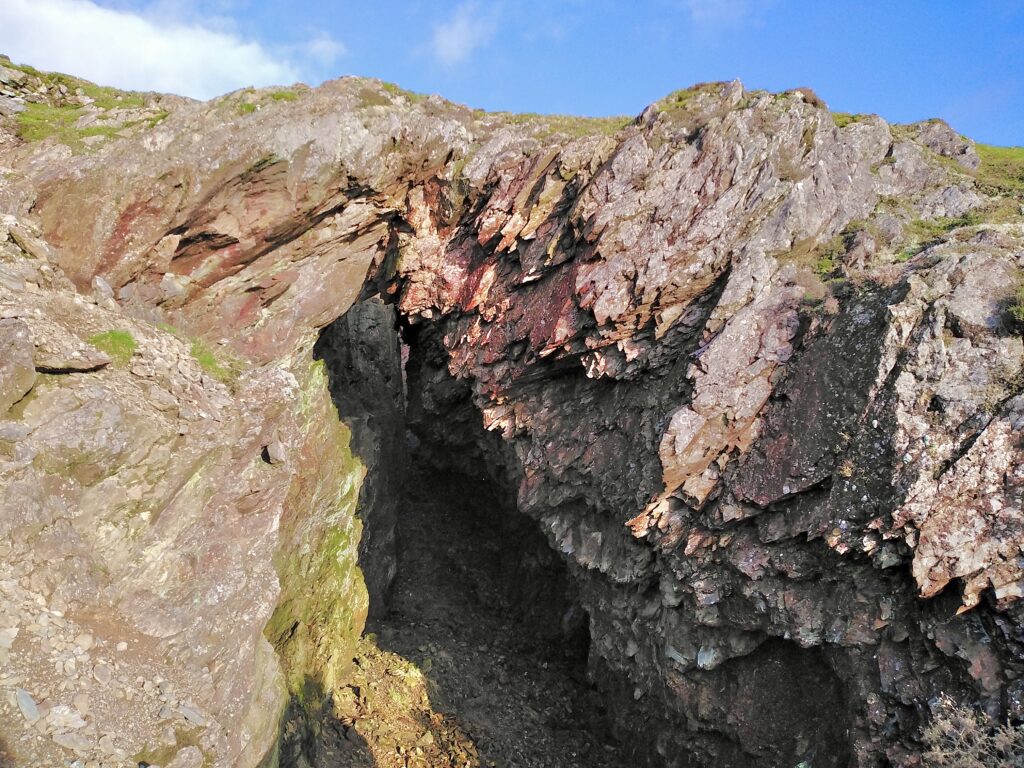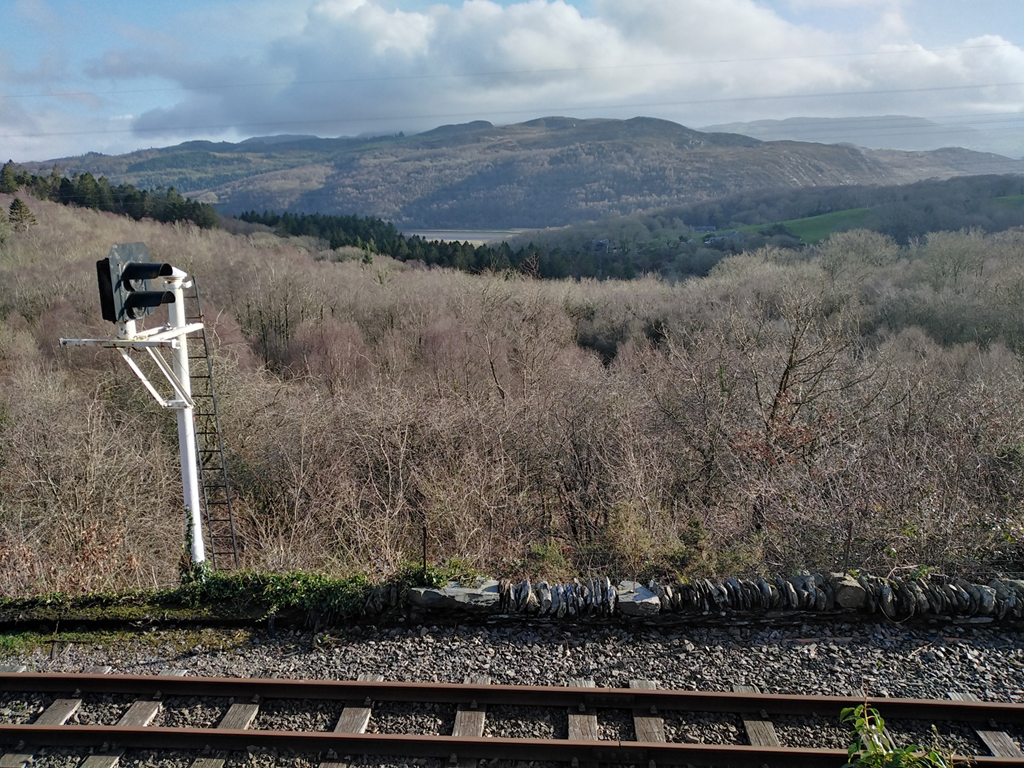
Late February. Above the Dwryd. Global Warning.
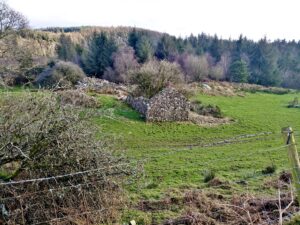 The smell of earth in February is premature. Earlier this week, I toiled in an English country garden at 18C whilst grass grew in front of my eyes. On Friday night at the top of Cwm Prysor it was 10C at 10pm.
The smell of earth in February is premature. Earlier this week, I toiled in an English country garden at 18C whilst grass grew in front of my eyes. On Friday night at the top of Cwm Prysor it was 10C at 10pm.
I know it rains here. I know the wind blows, but there is something afoot, and in a world where the science that delivered antibiotics and landed humans on the moon is routinely dismissed by the new generation of expert libertarian freedom-fighters, dispensing their wisdom on mobile devices developed by… yes… science, there’s a distinctly uphill feel to the battle.
These are the musings that flit through my mind approaching Rhiw Goch. Another sodden morning has given way to a billowy afternoon and the pines smell good. Although I welcome thoughts which distract me from the ankle I twisted a month ago, and which I’m only just beginning to trust, I’d have preferred considerations of less magnitude. It’s worrying. Looking down at the Dwryd, which appears fleetingly between the scrub, I’m given to imagining its inexorable rise. One day the measled grandchildren of climate change deniers will row up and down next to the Ffestiniog Railway as it sweeps along the current 50-metre contour, looking for tropical fish to spear …
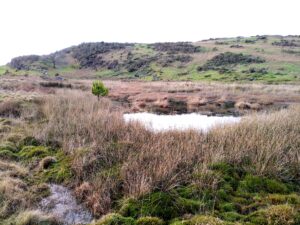 The hinterland above the Dwryd and below the Moelwynion is fascinating. First it’s all foresty and woodland-gladey, then it goes desolate foreboding, before alternating between atmospheric bogland, frowning outcrops and brooding sheets of water that might not even have been there until this year.
The hinterland above the Dwryd and below the Moelwynion is fascinating. First it’s all foresty and woodland-gladey, then it goes desolate foreboding, before alternating between atmospheric bogland, frowning outcrops and brooding sheets of water that might not even have been there until this year.
The further in I go, the more the silence aches. One ground-nester flees the undergrowth in an urgent flurry, but that aside, no bird sings, no crow caws and no sheep baa, for minutes at a time. And, when there IS sound, it is inevitably an orchestral warm-up of gurgling, trickling, rushing and occasionally thundering, water.
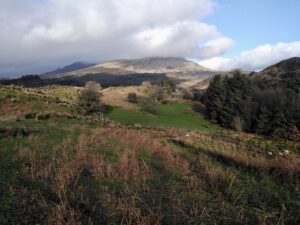 In a wild leap away from thoughts about climate catastrophe, my random-thought-Rolodex begins to riff on Welsh independence. Surplus of water? Tick. Surplus of renewable energy? Massive tick. Thriving tourist industry? Tick. Generations of colonial theft. Tick. Is that enough? Probably. Ireland’s GDP seems to be in very good shape and what have they got? The deeper I go into this mini-wilderness, the more the maxi-wilderness of Westminster is thrown into relief. Some volunteers wave from a maintenance train and speculation begins on what it would be like to be part of their gang. Do you have demonstrate any detailed knowledge of trains? Do you have to know the history of the railway? Do they use coal? Mine is a butterfly mind.
In a wild leap away from thoughts about climate catastrophe, my random-thought-Rolodex begins to riff on Welsh independence. Surplus of water? Tick. Surplus of renewable energy? Massive tick. Thriving tourist industry? Tick. Generations of colonial theft. Tick. Is that enough? Probably. Ireland’s GDP seems to be in very good shape and what have they got? The deeper I go into this mini-wilderness, the more the maxi-wilderness of Westminster is thrown into relief. Some volunteers wave from a maintenance train and speculation begins on what it would be like to be part of their gang. Do you have demonstrate any detailed knowledge of trains? Do you have to know the history of the railway? Do they use coal? Mine is a butterfly mind.
Upon reaching Rhyd, I take a breather. A sheet of soapy water spreads onto the lane from a driveway where, with what I see as a degree of irony, a man is washing a car. The band Pys Melyn has a song called Hosepipe Ban, the groove for which now begins to play in a loop in my head. Have they ever had a hosepipe ban in Rhyd?
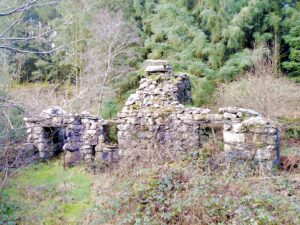 Soon, I’m back in the woods wishing I could restore the lead miners’ cottages behind Bwlch y Plwm. Magic on some roofs, clear the brambles away from the front, divert one of the myriad streams, and before you knew it, you’d be off-grid, catching rabbits, foraging for the rest of your food, and brewing pine beer and elderberry wine. The daydream is broken by a lad in a hi-vis training top who runs by at quite a clip and salutes me with a thumbs up. I’m standing waist-deep in brambles trying to take pictures of walls. It takes all sorts – is probably what he’s thinking.
Soon, I’m back in the woods wishing I could restore the lead miners’ cottages behind Bwlch y Plwm. Magic on some roofs, clear the brambles away from the front, divert one of the myriad streams, and before you knew it, you’d be off-grid, catching rabbits, foraging for the rest of your food, and brewing pine beer and elderberry wine. The daydream is broken by a lad in a hi-vis training top who runs by at quite a clip and salutes me with a thumbs up. I’m standing waist-deep in brambles trying to take pictures of walls. It takes all sorts – is probably what he’s thinking.
The remains of the mines themselves are interesting. Approaching them from above rather than the side, by virtue of straying from an indistinct track, is something of a jolt. A sheep perches on a ledge at the edge of a shaft, munching some tasty morsels. With a sense of the daring, I cross one of the narrow rock bridges that remains above the deep cut in the hillside. Can you get lead poisoning by eating grass? Be still, butterfly mind …
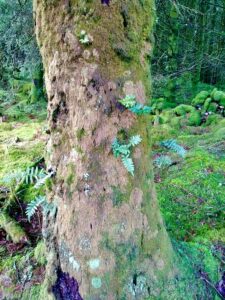 It’s so wet on the descent from the mine that the notion of ‘grip’ is more than a little fanciful. The nearer my destination, as Paul Simon sang, the more I’m slip-sliding away. A farmstead with a cluster of caravans broods beneath gathering, irregular, late-afternoon clouds – tucked away, mysterious, but not bleak. Another youthful stream rushes under an old stone bridge, hurrying to the Glaslyn Estuary to meet another ten-thousand rivulets newly born in the month-long deluge.
It’s so wet on the descent from the mine that the notion of ‘grip’ is more than a little fanciful. The nearer my destination, as Paul Simon sang, the more I’m slip-sliding away. A farmstead with a cluster of caravans broods beneath gathering, irregular, late-afternoon clouds – tucked away, mysterious, but not bleak. Another youthful stream rushes under an old stone bridge, hurrying to the Glaslyn Estuary to meet another ten-thousand rivulets newly born in the month-long deluge.
On arrival at that most beguiling of hostelries, Y Ring, Emlyn fills in the blanks of the nearby mining history. There was copper, too. We progress to discuss the lead and copper extraction at the head of Cwm Pennant – my recollection of the story is that the owners of those enterprises piggy-backed their transport onto the tramway that ran from the Prince of Wales Quarry on the side of Moel Lefn. I’d walked the said tramway last year after an elemental softening-up on Moel Lefn and Moel yr Ogof, in what they now call a ‘named storm’, had precipitated a relieving scurrying-down from Bwlch Meillionen. The conversation at the bar turns to the failed slate quarry at Cwm Ystradllyn. All that infrastructure; all that investment – all for nought. Bloke from Bangor …
In the midst of such a fine post-perambulating moider, it would be rude not to have another pint. I repeat my selection – Cascade, it’s called. It seems appropriate …